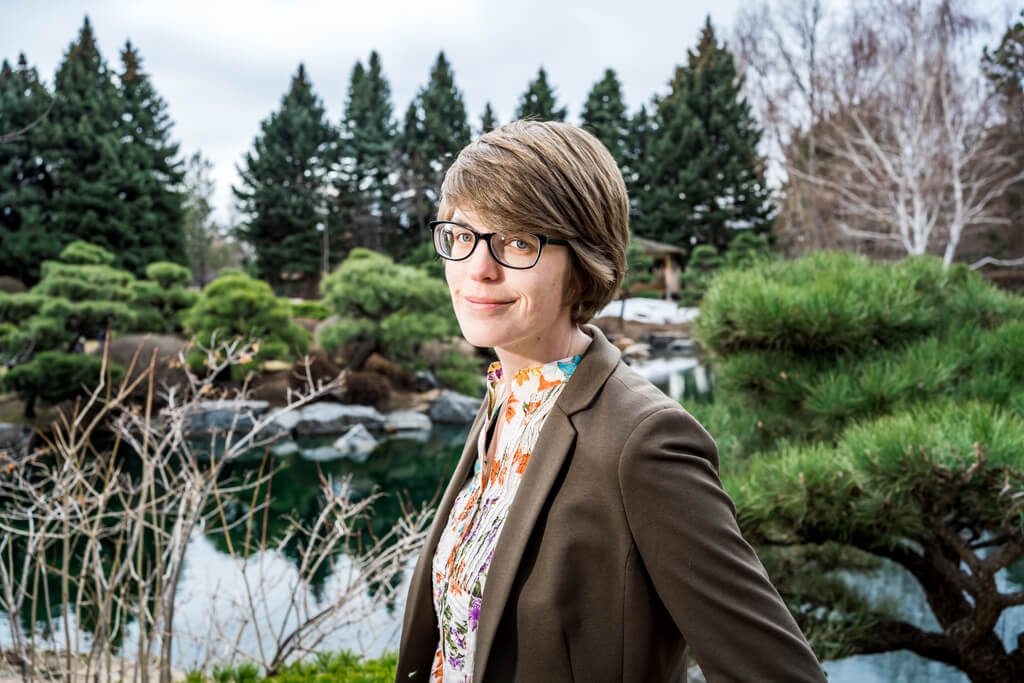‘You said you were sorry for dreaming’
A preview of Halchita Red
A preview of Halchita Red
Paige Buffington is a poet currently residing in Gallup, New Mexico. She is Navajo, of the Bear Enemies Clan, born for the White People. In her chapbook, Halchita Red, she explores the landscape of her home in all its spectacular and terrible beauty.

Paige Buffington
The first poem of this collection, “From 20 Miles Outside of Gallup, Holbrook, Winslow, Farmington, or Albuquerque,” won the Zócalo Poetry Prize in 2023. (You can read the entire poem, as well as a description of the prize, here.) The book will be published by Middle Creek Publishing & Audio, based in Beulah, Colorado, and is set for release in the spring of 2025.
Halchita Red is a collection that evokes place: the red desert of Arizona and New Mexico, the heat of that sun and the cold of those nights. Within that context, it is a collection of losing, gaining, wanting, having, leaving and returning.
Many of the pieces in Buffington’s book are prose poems, written as blocks of text like paragraphs. But don’t be fooled. Each line is just as thoughtful, just as crafted, just as powerful as those of more traditional poetry. In these poems a reader can get lost, a process happily encouraged by Buffington’s frequent use of second person pronouns. We are there. We taste the wind. We smell the sagebrush. We feel our fingers sticking to the table of a midnight diner. Buffington sucks us into this narrative and does not let us go.
In the arc of this collection, Buffington describes the people who leave the landscape and the people who stay. The speaker of these poems moves through multiple intertwined stories: their own story of leaving and coming back, their first love’s battle with war-related PTSD, their sister’s constant struggle with drugs or crime or simply being alone. In the poem “Sun Dagger,” a father decides to leave his daughter and her sister with their grandmother. The two girls watch as he packs his truck and then they climb out the window, dashing across the yard and crawling over the tailgate and into the stifling closeness, waiting quietly until they feel the truck move:
[We] listened to the hum of the highway, counted streetlights,
you asked if we were moving west. Dad stopped the truck
when he heard voices from the camper. Goddamn girls. I’m not
going all the way back. Remember? We turned into a Wal-Mart in
Winslow, he yelled into the payphone, gave a clerk twenty
dollars, she said she’d take care of us until our grandma got
there. She held you while you cried, whispered in your ear like
it was the day you were born. She taught us how to count to
ten in her language, made bologna sandwiches, gave us honey
packets for dessert while we waited, you said you were sorry
for dreaming. You said you thought Dad was taking us back to
Canyonlands or to California, you never stopped crying after
his truck, but I looked toward the interstate for grandma’s car.
I was happy to go home.
Buffington’s descriptions of staying are as bleak, but somehow cozy, comforting and strong. She describes women in their homes, keeping the space ready for those who left them behind. In the poem “The Men in Your Family,” the speaker talks of her grandmother: “Grandma lingered around grease splatter decades dry, always / had some potatoes going, eggs frying for the babies, plates kept / warm in the oven for her wandering sons.” The speaker’s grandmother is a consistent figure of stability; she is there for the girls when their father and their mother cannot be. Later in the poem, the speaker continues, “There, sisters crack blue paper bread in their kitchen, talk of / the last time they saw their brother. Maybe he was arrested in / Flagstaff. Maybe he ran off with a white woman. Maybe his line / led him off the edge of this world.” There is so much longing in these words, but a lot of togetherness too. And the same can be said of the entire collection. It is as much about isolation as it is about community. It is the blinding glare of the sun and the dark road at night.
I finished reading Halchita Red, closed the book and sat for a while in silence. In my mind I could see the rusty stone and the ancient fossils within. I felt the grit of sand in my teeth and the touch of a fragrant breeze in my hair. I was there, still. No doubt, other readers will have the same experience.
While Marissa Harwood was born in Omaha, Nebraska, she moved to Colorado when she was four days old and considers herself a native. She grew up in the shadow of the Rocky Mountains and spent much of her childhood camping, hiking and building forts in the woods. She earned a BA in English and a Secondary Teaching License from the University of Colorado at Boulder. Later, she attended Western Colorado University and earned an MFA in genre fiction. She has taught English at three K-12 schools and two Colorado colleges. Currently, she lives in Greeley, where she teaches high school, plays with her daughter (a true CO native) and reads a lot of books. She hopes to earn a doctorate in the near future.
Click here for more from Marissa Harwood.

